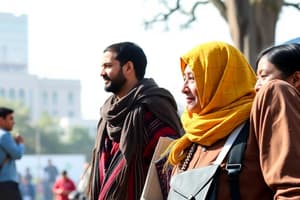Podcast
Questions and Answers
What is a primary means of communication that reflects cultural heritage?
What is a primary means of communication that reflects cultural heritage?
- Language (correct)
- Social norms
- Religious practices
- Historical events
Which of the following factors plays a critical role in the formation of cultural identity?
Which of the following factors plays a critical role in the formation of cultural identity?
- Environmental changes
- Global economy
- Technological advancements
- Socialization (correct)
What concept describes the blending of cultures resulting from globalization?
What concept describes the blending of cultures resulting from globalization?
- Cultural hybridity (correct)
- Cultural assimilation
- Cultural preservation
- Cultural appropriation
Which challenge to cultural identity involves the loss of cultural ties due to movement?
Which challenge to cultural identity involves the loss of cultural ties due to movement?
What tension exists between adapting to modern influences and maintaining traditional practices?
What tension exists between adapting to modern influences and maintaining traditional practices?
Which of the following is an influence of cultural identity on an individual?
Which of the following is an influence of cultural identity on an individual?
What negative consequence can arise from assimilation into a dominant culture?
What negative consequence can arise from assimilation into a dominant culture?
What is one important significance of cultural identity in a community?
What is one important significance of cultural identity in a community?
Flashcards are hidden until you start studying
Study Notes
Understanding Cultural Identity
-
Definition: Cultural identity refers to the feeling of belonging to a particular culture and the influences of that culture on an individual’s worldview, behaviors, and values.
-
Components of Cultural Identity:
- Language: Primary means of communication; reflects cultural heritage.
- Traditions and Customs: Practices passed down through generations; includes rituals, celebrations, and social norms.
- Beliefs and Values: Core principles guiding behaviors and decision-making; influences moral and ethical perspectives.
- Art and Expression: Includes art, music, literature, and dance that signify cultural narratives and experiences.
-
Formation of Cultural Identity:
- Socialization: Family, peers, and community play critical roles in shaping cultural identity from a young age.
- Media Influence: Television, literature, and social media contribute to the perception and evolution of cultural identity.
- Historical Context: Past events, migration, colonization, and socio-political changes impact cultural identity.
-
Cultural Identity in a Globalized World:
- Cultural Hybridity: The blending of cultures resulting from globalization; can create new cultural identities.
- Preservation vs. Change: Tension between maintaining traditional practices and adapting to modern influences.
- Cultural Appropriation: Misuse of one culture's elements by another, often without understanding or respect.
-
Challenges to Cultural Identity:
- Displacement: Migration and refugee crises can lead to identity crises and loss of cultural ties.
- Assimilation: Pressure to conform to dominant cultures can dilute or erase minority cultural identities.
- Intergenerational Conflict: Differences in cultural values and practices between generations can create tensions.
-
Significance of Cultural Identity:
- Sense of Belonging: Enhances individual self-esteem and community solidarity.
- Social Cohesion: Fosters connections among members of the same cultural group, promoting collective action.
- Diversity: Enriches society through varied perspectives, practices, and contributions from different cultures.
-
Cultural Identity and Politics:
- Political Representation: Cultural identity can influence political behavior and advocacy for community rights.
- Identity Politics: Group identity can shape political movements and policies, often focusing on issues of representation and equality.
This summary provides an overview of cultural identity and its complexities, highlighting its importance in society and politics.
Definition of Cultural Identity
- Refers to the feeling of belonging to a specific culture.
- Influences an individual's worldview, behaviors, and values.
Components of Cultural Identity
- Language: Primary communication tool; embodies cultural heritage.
- Traditions and Customs: Generational practices; includes rituals, celebrations, and social norms.
- Beliefs and Values: Core principles that guide actions and decisions; shapes moral and ethical viewpoints.
- Art and Expression: Encompasses art, music, literature, and dance that reflect cultural narratives and experiences.
Formation of Cultural Identity
- Socialization: Role of family, peers, and community in developing cultural identity from a young age.
- Media Influence: Impact of television, literature, and social media on cultural identity perception and evolution.
- Historical Context: Events like migration, colonization, and socio-political shifts that shape cultural identity.
Cultural Identity in a Globalized World
- Cultural Hybridity: Result of globalization leading to the merging of different cultures and creation of new identities.
- Preservation vs. Change: Balancing traditional practices with modern influences.
- Cultural Appropriation: Misuse of elements from one culture by another, often lacking understanding or respect.
Challenges to Cultural Identity
- Displacement: Migration and refugee situations can cause identity crises and sever cultural connections.
- Assimilation: Pressure to adopt dominant cultures may dilute or erase minority cultural identities.
- Intergenerational Conflict: Differences in cultural values and practices between generations resulting in tensions.
Significance of Cultural Identity
- Sense of Belonging: Contributes to individual self-esteem and community unity.
- Social Cohesion: Strengthens connections among cultural group members, promoting collective actions.
- Diversity: Enriches societal experiences through various perspectives, practices, and cultural contributions.
Cultural Identity and Politics
- Political Representation: Cultural identity influences political actions and advocacy for community rights.
- Identity Politics: Group identity drives political movements, focusing on representation and equality issues.
Studying That Suits You
Use AI to generate personalized quizzes and flashcards to suit your learning preferences.




